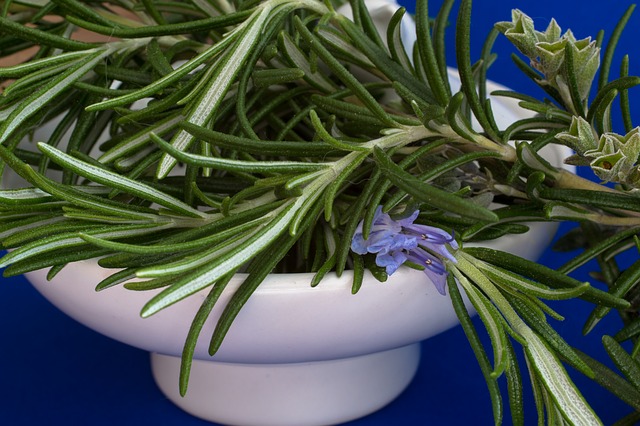Rosemary Leaf
Also known as
Rosmarinus officinalis, Romero, and Dew of the Sea.
Introduction
Rosemary is an aromatic evergreen mint that grows to a height of about three feet (one meter). It bears narrow, thick, needle-like green leaves and pale blue to violet flowers. The leaves and the essential oil distilled form the leaves are used in herbal medicine. Food manufacturers add rosemary to meats and sauces as an antioxidant and stabilizer. The herb is also used to make liqueurs, such as Benedictine and Danziger Goldwasser.
Constituents
1,8-cineole, acetic acid, camphor, carnosol, carvacrol, carvone, caryophyllene, chlorogenic acid, geraniol, hesperidin, limonene, luteolin, rosmarinic acid, salicylates.
Parts Used
Dried leaf.
Typical Preparations
Teas and tinctures, however it is most popularly used in cooking. The essential oil is used in aromatherapy but should not be taken internally.
Summary
Antioxidant, antiseptic, and antispasmodic- Rosemary is a key herb in European herbal medicine. For centuries, rosemary has been used to treat arthritis, baldness, headaches, stomach upset, pains, strains, cuts, scrapes, and bruises. Contemporary scientific research suggests that rosemary may be useful for: Alzheimer's disease- phytochemicals in rosemary may prevent the breakdown of acetylcholine, a chemical that allows neurons within the brain to communicate with each other. Cancer- several laboratory studies suggest that rosemary contains compounds that prevent carcinogenic chemicals from binding to and inducing mutations in DNA. Circulatory problems- the camphor content in finely chopped rosemary or essential oil of rosemary to bath water helps stimulate blood circulation through the skin. Eczema- increased circulation in the skin after application of rosemary may carry away inflammatory chemicals. Indigestion. Rosemary can help prevent abdominal cramps. Irritable bowel syndrome- Rosemary relieves intestinal cramps and spasms by stimulating the release of bile that helps digest fat. It also relieves bloating and gas. Menstrual cramps- antioxidant compounds in rosemary prevent uterine spasms. Yeast infection- Rosemary is not only fungicidal but also diuretic. It stops growth of yeast and helps remove yeast cells from the lining of the urinary tract.
Precautions: Women who have heavy periods should avoid excessive use of rosemary, since it stimulate menstrual flow. The herb should not be used medicinally during pregnancy. Small amounts of rosemary used in cooking, however, are safe for pregnant women and for women who have heavy periods.
PURCHASE ROSEMARY LEAF EXTRACT
For educational purposes only. This information has not been evaluated by the Food and Drug Administration.
This information is not intended to diagnose, treat, cure, or prevent any disease.
Unless otherwise stated, this information courtesy of MOUNTAIN ROSE HERBS, with full, written permission for reuse. For further traditional information concerning ROSEMARY, please visit this excellent resource fromBotanical.com. Used with full, written permission.







